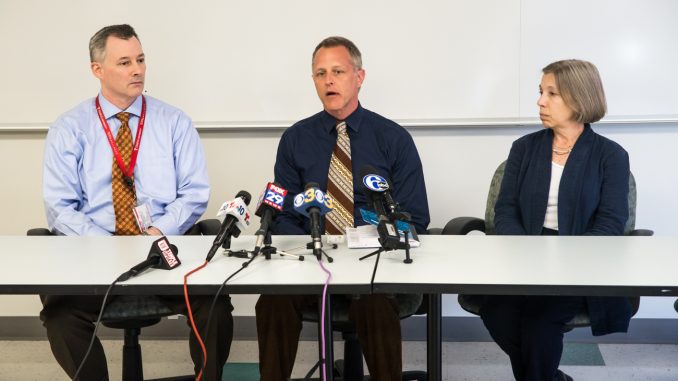
University and city officials held a press conference on Tuesday about the ongoing mumps outbreak at Temple University, the day before Temple will hold its first of two walk-in vaccination clinics.
There are 105 Temple-related mumps cases as of Tuesday, said Dr. Steven Alles, the director of disease control for the Philadelphia Department of Public Health. Eighteen cases are confirmed and 87 are probable, and officials receive reports of about five new cases each day, Alles added.
There are 19 students living in on-campus residence halls with the mumps, Mark Denys, director of Employee and Student Health Services, told The Temple News. Two of those cases were discovered within the last week.
Someone with mumps is considered contagious two days before their face swells, through five days after, according to a university release. It’s recommended that people with mumps isolate themselves so they’re less likely to infect other people.
Student Health Services is encouraging students to speak to their Resident Assistant if they suspect they have the mumps, in addition to self-isolating, a practice that can prevent others from being infected, Denys said. Dining Services will work with students if they aren’t able to leave their residence halls for meals, he added.
The outbreak has also spread to nearby universities, like Drexel and West Chester universities. Students at two K-12 schools in the region, Abington Senior High School and North Wales Elementary School, contracted the mumps, CBS3 reported. A staff member at Temple is also among the 105 Temple-related cases, Denys said.
The university is prepared to administer 1,800 booster shots of the Mumps, Measles and Rubella vaccines on Wednesday during its first vaccination clinic, Denys said. Students, faculty and staff can receive a free booster shot at Mitten Hall’s Great Court from 9 a.m. to 4 p.m. on Wednesday and Friday by showing their OWLcards.
The university and local pharmacies have administered 1,000 booster shots in the city since the outbreak began on Feb. 28, Denys said. About 300 were administered by Temple at Student Health Services.
Officials haven’t concluded whether any of the people infected with mumps were not vaccinated before contracting the viral infection, Denys said.
It’s widely recommended that people receive two shots of the MMR vaccine by the time they’re 6 years old, L.J. Tan, chief strategy officer of the Immunization Action Coalition for the Centers for Disease Control and Prevention, told The Temple News earlier this month.
The immunity of people who have received the vaccine decreases over time, Tan added, making them more susceptible to mumps. A third booster shot is recommended for anyone near an outbreak.
It takes about two weeks for a booster shot to reach a “good level of immunity,” said Dr. Susan Coffin, the medical director of the healthcare associated infections program in the Philadelphia Department of Public Health.
The university offered the vaccination clinics nearly one month after it first announced the outbreak at the end of February. It’s likely there was a “first wave” of mumps cases before the announcement that went unreported, Alles said.
“We are now in the secondary wave of mumps transmission,” Alles said. “The initial cases began in January and then you started to see the bigger wave of transmission that occurred in late February where we had about 30, 35 associate cases.”
The Philadelphia Department of Public Health expects to continue to see new cases through the end of the semester, Alles added.
Through its investigation, the university and city have found “patient zero,” the first person who was infected with the disease, Alles said. Students are more prone to contracting the infection because of partying, social gatherings and close-knit living situations, he said.
Viral diseases like the mumps have a high likelihood of spreading among close-knit groups like sports teams and Greek life organizations, according to the CDC.
Denys told The Temple News that the university and city have not identified such a pattern in the outbreak and that “really almost everybody on campus” could be at high risk for contracting mumps.
“I wish there was [a pattern],” Denys said. “If there was one, we could target those [groups] and that would be great, but it really is kind of all over the place.”
Officials are hoping increased awareness about the outbreak will reduce the number of cases, Denys said.
“We have a handle on it, but as Dr. Alles said, we’re probably going to see another wave coming,” Denys said. “We’re expecting more cases and hopefully the numbers will start coming down.”
Students experiencing symptoms should contact Student and Employee Health Services.


Be the first to comment